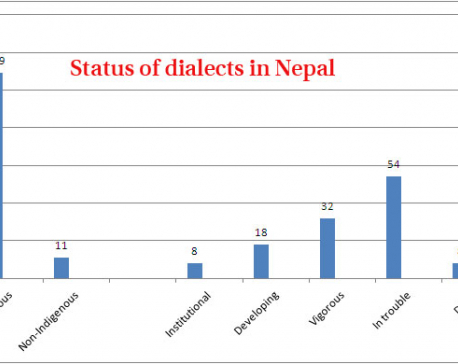
OR
Lakes, ponds on the verge of extinction in Tinjure area
Published On: January 13, 2018 04:04 PM NPT
TEHRATHUM, Jan 13: The natural lakes and ponds in Tinjure Milke Jaljale area are gradually drying up for lack of conservation.
Tinjure Milke Jaljale area, the bordering location of Tehrathum, Sankhuwasabha and Taplejung districts, is also known as the capital of rhododendron. The area with rich bio-diversity is the home to 28 species of rhododendrons out of 32 types found in the country.
A large number of lakes and ponds in the geography are drying up every year in absence of conservation measures, and encroachment.
The level of water in the lakes and ponds has receded due to construction of roads and increased human settlements, local residents bemoaned.
The local residents said that around two dozens of lakes were found until two decades ago in the areas above from Basantapur of Tehrathum. They said Panchpokhari, Sukepokhari, Bhutepokhari, Jorpokhari, Khopkin Pokhari and many other lakes and ponds have dried up in the last two decades.
Likewise, the water level in Guphapokhari, Lampokhari, Sabhapokhari and some others has gradually decreased.
Furthermore, the water level has gone down in Margapokhari, a pond located in the bordering area of Tehrathum and Dhankuta districts. In the past, the human settlements in the area used to be at risk due to overflow of water from the Margapokhari.
Narayan Dahal of Shreejanghu said that all five ponds have dried up adding that only ditches are visible instead of the water at present.
Likewise, the existence of beautiful lakes Sukepokhari and Jorpokhari has come to an end with no water in them.
Hari Khanal, a local resident, said the water level is rapidly decreasing in Guphapokhari and no one knows what the status of this pond will be within ten years if the trend continues same.
In the pond, dams were constructed some years to control its outburst but the water level has rapidly shrunk going below the dams.
Khanal added that a large number of migratory birds used to come in the areas for their safe habitat but now birds are not visible due to lack of sufficient water in the ponds.
Khanal shared that livelihood of the local community is also affected and they have faced shortage of water to feed the cattle in dry seasons.
Furthermore, the tourists visiting Guphapokhari have returned without sweet memories of the area as the area has lost its natural beauties and aura.
Environmentalist Mausham Khanal warned that Guphapokhari's existence would end within five/seven years if the water dries up in the same ratio. "I spent my five years with the natural heritages of this area. Existence of the pond is unlikely after seven years if the current trend continues," he shared.
You May Like This

Vultures on verge of extinction in Nepal
Baitadi, Feb 22: The vultures known as the nature's scavengers are alarmingly on verge of extinction with dwindling nesting habitats... Read More...

Local dialects on verge of extinction in lack of utility
KATHMANDU, Aug 12: At a time schools and colleges are happy teaching foreign languages, fueling massive brain drain from the... Read More...

Lacking utility, local dialects on verge of extinction
KATHMANDU, Aug 3: At a time when universities, colleges and private education institutes are vigorously promoting foreign languages, no one... Read More...







Just In
- NRB to provide collateral-free loans to foreign employment seekers
- NEB to publish Grade 12 results next week
- Body handover begins; Relatives remain dissatisfied with insurance, compensation amount
- NC defers its plan to join Koshi govt
- NRB to review microfinance loan interest rate
- 134 dead in floods and landslides since onset of monsoon this year
- Mahakali Irrigation Project sees only 22 percent physical progress in 18 years
- Singapore now holds world's most powerful passport; Nepal stays at 98th











Leave A Comment